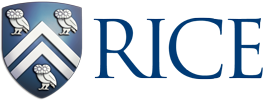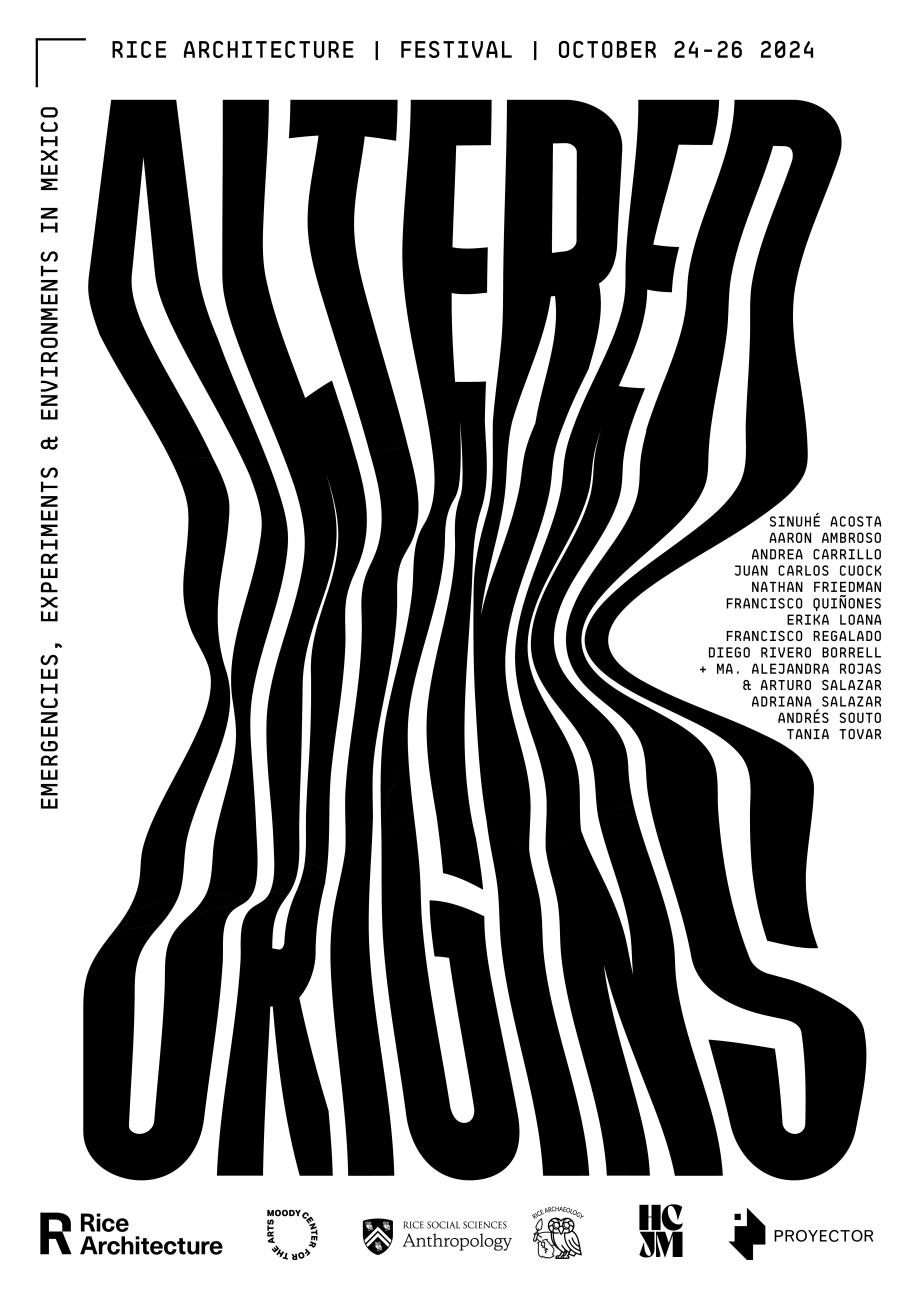All activities of Altered Origins are free. Registration is required for workshops. To register, click here.
OPENING REMARKS
10:00 am–10:30 am
Andrew Colopy, Rice School of Architecture
Tania Tovar, Proyector
MD Anderson Hall, Farish Gallery
MORNING WORKSHOPS
10:30 am–12:00 pm
Digital Clay | Session 1
Sinuhé Acosta, Random Studio
MD Anderson Hall, Jury Gallery
This two-day workshop will explore the creative possibilities of 3D-printed clay. Participants will learn how to manipulate the material’s unique properties and turn defects and imperfections into intentional design elements. The Experimental 3D Modeling Workshop is a theoretical-practical course covering techniques and methodologies developed in our experimental workshop for the creation of ceramic pieces with modified 3D printers. The primary 3D modeling software will be Blender, and Cura will be used for the slicing of final prints.
Collective Digitization: Collaborative 3D Scanning | Session 1
Francisco Regalado, Laboratorio de Arte, Arquitectura y Arqueología
Sewall Hall, Archaeology Lab
This workshop explores collaborative methods for 3D scanning of artifacts, to democratize the information embedded in them. Although every country has its own set of laws and ethics around cultural heritage, the digital world may hold the key to democratizing access to it anywhere and everywhere. In response to this intricate landscape, this two-day workshop is dedicated to exploring the intersection of cultural heritage and digital innovation. Participants will learn to use photogrammetry, a powerful tool that can transform private cultural collections into accessible public resources. Through a series of collaborative sessions, attendees will dive into the practicalities and possibilities of digitization. Drawing from diverse case studies, participants will explore methodologies for capturing, processing, and preserving artifacts in the digital realm.
AFTERNOON WORKSHOPS
1:00 pm–4:00 pm
Hyper-Popular: Exploring Popular Culture Through Digital Spaces
Andrés Souto, mUcHo estudio/taller
William T. Cannady Hall, Fabrication Workshop
This workshop investigates the concept of popular culture, beginning with John Fiske’s distinction between mass culture and popular culture. Fiske argues that mass culture comprises the cultural products put out by an industrialized, capitalist society, while popular culture is actively created and reshaped by the people, using the products of mass culture to create their own meanings and messages. In this context, participants will explore digital spaces, such as the Trimble 3D Warehouse, that are becoming new spaces for the production of popular culture. Participants will investigate models uploaded by users to this digital repository, engaging with how these platforms democratize design and creativity. Through playful editing, deformation, and remixing of the models, participants will produce unique architectural objects. The workshop culminates in 3D-printing the digital creations, followed by the application of textures and colors. This hands-on exploration invites participants to challenge traditional notions of taste, architecture, and design, emphasizing how popular culture continues to evolve in digital spaces, blurring the lines between consumer and creator.
Solid Matter, Liquid Matter
Adriana Salazar, Independent Artist
William T. Cannady Hall, International Bridge
In this workshop, participants will explore the continuity between our bones and the rocks that compose the foundations of the earth we live on. Participants will also identify connections between the water inside us and the bodies of water we depend on for survival. In recognizing what connects us to the land upon which we have built our home, participants are invited to inquire about its histories from an embodied approach. That is, participants’ own bodies will be the starting point for an experimental cartography that follows “body-territory” mapping practices proposed by various collectives of women across Latin America. Participants will adopt, appropriate, choreograph, soften, twist, and turn these practices to make them respond to their personal territories. Solid Matter, Liquid Matter will thus be a space in which to reinterpret mapping practices beyond their traditional forms.
PRACTICE CONVERSATION
Digitized Realities
5:00 pm–7:00pm
Andrés Souto, mUcHo estudio/taller
Francisco Regalado, Laboratorio de Arte, Arquitectura y Arqueología
Sinuhé Acosta, Random Studio
Response: Juan Carlos Cuock, Proyector
MD Anderson Hall, Farish Gallery
The panel examines practices that reinject craft into digital workflows in architecture. Such practices use digital tools to explore alternative narratives, challenging the idea that architecture is just the repeated application of computerized processes. By looking at everything from popular aesthetics and DIY construction to art and archaeological preservation methods, they question modern ideas of authorship, highlighting the role of artisanship in reclaiming architectural production from automated systems. While craft has often been linked to traditional or vernacular architecture, these practitioners redefine it as a sign of the human element in production, showing its natural fit with digital fabrication methods.
ABOUT THE EVENT
To think about origins is to think about sources, materials, and places of provenance: natural or artificial, physical or virtual. The question of origins, however, is bound to the question of their alteration. Only when something changes, are we left asking where it came from. Transformations, in all scales and temporalities, have always been present in architecture: from the slow degradation of ancient ruins to the immediate repetitions of digital images. Architecture and its objects are not only inevitably bound to face alterations, but architectural practices have also incorporated them at the core of their methodologies, mixing old traditional processes and new technological tools in various gradients and conditions. Mass and digital production and dissemination methods are making for fast-changing conditions in architecture, taking a particular interest in replicating and reproducing objects, processes, and experiences. As technical and technological tools evolve, so do the forces that objects undergo, changing media, shape, location, temporality, and meaning.
Altered Origins invites contemporary spatial practitioners in Mexico who work at the intersection of architecture and the arts to share their insights into the physical and conceptual transformations, media, and disciplinary intersections shaping contemporary architectural discourse and practice through an open exchange of methodologies and experiments.
The three-day festival, featuring a program of open workshops, conversations, and live performances, will be held from 24 to 26 October at multiple venues in and around Rice University, including the Rice School of Architecture, the Archaeology Lab of the Rice University Anthropology Department, the Moody Center for the Arts, and the Houston Climate Justice Museum.
PARTICIPANTS:
Sinuhé Acosta, Random Studio
Aaron Ambroso, Houston Climate Justice Museum
Andrea Carrillo Iglesias, Independent Artist
Nathan Friedman and Francisco Quiñones, Departamento del Distrito
Erika Loana, Materia Prima
Francisco Regalado, Laboratorio de Arte, Arquitectura y Arqueología
Diego Rivero Borrell, TANAT + María Alejandra Rojas and Arturo Salazar
Adriana Salazar, Independent Artist
Andrés Souto, mUcHo estudio/taller
Tania Tovar and Juan Carlos Cuock, Proyector


